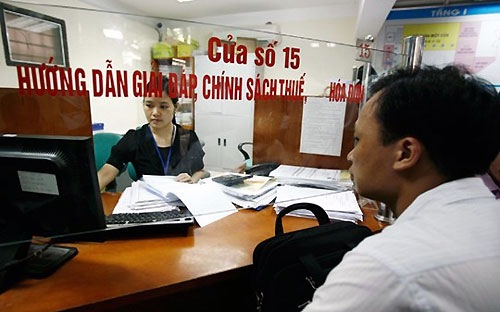What shall enterprises in Vietnam pay attention to when the 2019 Labor Code comes into effect? This is a question that Lawnet has received quite frequently recently. Lawnet would like to provide an explanation of this issue in the article below.

Enterprises in Vietnam Need to Note These 16 Points When the 2019 Labor Code Takes Effect
The Labor Code 2019 was officially passed by the 14th National Assembly on November 20, 2019, and will take effect from January 1, 2021 in Vietnam. From the date this Code takes effect, enterprises in Vietnam need to pay attention to the following provisions:
Parties may enter into labor contracts online in Vietnam
Specifically, according to Article 14 of the Labor Code 2019, in addition to the two current forms of labor contracts, which are verbal and written, from January 1, 2021, employers and employees may enter into labor contracts through electronic means in the form of data messages. Labor contracts entered into through electronic means in the form of data messages as prescribed by law on electronic transactions are as valid as written labor contracts.
Seasonal labor contracts with employees in Vietnam are prohibited
Specifically, according to the content of the Labor Code 2019, from the date this Code takes effect, employers and employees can only enter into one of the following types of labor contracts:
- An indefinite-term labor contract is a contract in which both parties do not determine the term and the time of termination of the contract's validity;
- A definite-term labor contract is a contract in which both parties determine the term and the time of termination of the contract's validity within a period not exceeding 36 months from the effective date of the contract.
Thus, the Labor Code 2019 has removed the type of seasonal labor contract from the types of labor contracts that employees and employers are allowed to enter into. From January 1, 2021, there will be only two types of labor contracts: definite-term and indefinite-term labor contracts.
Employers in Vietnam are prohibited from forcing employees to work to pay off debt
Specifically, Article 17 of the Labor Code 2019 added a new prohibited act for employers when entering into, executing labor contracts: "Forcing employees to execute labor contracts to pay off debt for employers."
Thus, from the effective date of the Labor Code 2019, employers will not be allowed to require employees to enter into labor contracts with them to repay the money borrowed by the employee, or in other words, to offset debt.
Probation is allowed for management personnel
Specifically, Article 25 of the Labor Code 2019 added a new regulation on the probation period for enterprise management personnel. The probation period is agreed upon by both parties based on the complexity and the nature of the job but can only be probationary once for a particular job and must not exceed 180 days for the job of enterprise management personnel according to the Law on Enterprises, the Law on Management and Use of State Capital Invested in Production and Business in Enterprises.
Adding 03 cases where enterprises can unilaterally terminate labor contracts in Vietnam
The Labor Code 2019 has supplemented 03 cases where employers are entitled to unilaterally terminate labor contracts with employees besides those previously specified in the Labor Code 2012, specifically:
- Employees who reach the retirement age as prescribed in Article 169 of this Code, except where there are other agreements;
- Employees who abandon their job without legitimate reasons for 05 consecutive working days or more;
- Employees who provide false information according to Clause 2 Article 16 of this Code when entering into labor contracts, affecting recruitment.
Notably, the case of unilateral termination when employees abandon their job without legitimate reasons for 05 consecutive working days or more is noteworthy. Under the current Labor Code 2012, this is a case where employees are subjected to dismissal. According to the current regulations, disciplinary action against employees must be conducted according to legal principles and procedures.
With the new regulations in the Labor Code 2019, from January 1, 2021, employers will have the right to unilaterally terminate labor contracts immediately without notice and without going through the disciplinary process for employees who abandon their job without legitimate reasons for 05 consecutive working days or more.
Enterprises in Vietnam can terminate labor contracts without notice
Specifically, the Labor Code 2019 stipulates that when employees abandon their job for 05 consecutive days or more without notifying the employer, without legitimate reasons, or fail to return to work after the period specified in Article 31 of this Code, employers can unilaterally terminate the labor contract without notice to employees.
Break time during working hours is not included in working hours
Specifically, according to the Labor Code 2019, employees working regular hours of 06 hours or more per day are entitled to at least 30 minutes of uninterrupted break time; employees working at night are entitled to at least 45 minutes of uninterrupted break time, not included in working hours; employees working in shifts have their break time included in working hours.
Thus, from January 1, 2021, break time during shift work will be included in working hours; for regular working hours, break time will not be included.
Currently, under the Labor Code 2012, break time for employees working regular hours is still included in working hours.
Unilateral termination of labor contracts with pregnant employees is prohibited
According to Clause 3, Article 37 of the Labor Code 2019, employers are not allowed to unilaterally terminate labor contracts when “female employees are pregnant; employees are on maternity leave or raising children under 12 months of age”. Thus, when employees are pregnant or raising children under 12 months of age and fall into cases of unilateral termination of labor contracts, employers are not allowed to unilaterally terminate the labor contracts.
Previously, Clause 3, Article 155 only stipulated: “Employers are not allowed to dismiss or unilaterally terminate labor contracts with female employees for reasons of marriage, pregnancy, maternity leave, raising children under 12 months of age...”. However, in practice, many female employees while pregnant or raising children under 12 months of age still faced unilateral termination for other reasons such as frequently failing to meet job requirements according to the labor contract.
Additionally, the Labor Code 2019 emphasizes that from January 1, 2021, employers are prohibited from unilaterally terminating labor contracts with male employees who are raising children under 12 months of age or during the period of maternity leave policies as stipulated in the Social Insurance Law. If the labor contract expires while female employees are pregnant or raising children under 12 months of age, they are given priority to enter into a new labor contract.
Multiple definite-term contracts with older employees
The Labor Code 2019 stipulates that when employing older employees, employers can agree to enter into multiple definite-term labor contracts with older employees instead of extending the term of the labor contract or entering into new contracts as stipulated in the Labor Code 2012.
Additional authority for resolving individual labor disputes
Article 187 of the Labor Code 2019 specifies the competent authorities to resolve individual labor disputes include:
- Labor conciliators;
- Labor arbitration councils;
- People's Courts.
Compared to the Labor Code 2012, the Labor Code 2019 has added labor arbitration councils to the authorities resolving individual labor disputes.
Furthermore, under the Labor Code 2019, from January 1, 2021, labor arbitration councils also have the authority to resolve collective labor disputes over rights. Meanwhile, the authority of "Chairpersons of district-level People's Committees" is abolished.
Thus, from January 1, 2021, labor arbitration councils will have additional authority in resolving individual labor disputes and collective labor disputes over rights, in addition to their existing authority in resolving collective labor disputes over interests as prescribed in the Labor Code 2012.
Many enterprises must revise their labor regulations

Many enterprises must revise their labor regulations - Illustrative image
Currently, according to Clause 2 Article 119 of the Labor Code 2012, labor regulations of enterprises include 5 main contents:
- Working hours, rest periods;
- Order at the workplace;
- Occupational safety and health at the workplace;
- Protection of assets and business secrets, technological secrets, intellectual property of the employer;
- Violations of labor discipline by employees and disciplinary measures, material responsibilities.
However, from January 1, 2021, when the Labor Code 2019 takes effect, labor regulations of enterprises must also include the following additional contents:
- Prevention and combat of sexual harassment at the workplace; procedures for handling acts of sexual harassment at the workplace;
- Cases of temporarily transferring employees to work different from the labor contract;
- Persons authorized to handle labor discipline.
Thus, compared to the current regulations, from January 1, 2021, labor regulations will have additional mandatory contents to better protect employees' rights. If the current labor regulations of enterprises do not fully include the above contents, enterprises must promptly revise and supplement them according to the new regulations of the Labor Code 2019.
Increasing retirement age to 60 for women, 62 for men
Specifically, according to Article 169 of the Labor Code 2019, the retirement age for employees in normal working conditions is adjusted according to a schedule until reaching 62 years for men in 2028 and 60 years for women in 2035.
From 2021, the retirement age for employees in normal working conditions is 60 years 03 months for men and 55 years 04 months for women; thereafter, each year adds 03 months for men and 04 months for women.
For employees with reduced work capacity; those engaged in particularly heavy, hazardous, dangerous jobs; heavy, hazardous, dangerous jobs; those working in areas with extremely difficult socio-economic conditions, they may retire at an age lower than but not exceeding 05 years compared to the stipulated retirement age, except where otherwise provided by law. Employees with high professional and technical qualifications and in special cases may retire at an age higher than but not exceeding 05 years compared to the stipulated retirement age, except where otherwise provided by law.
Thus, from 2021, each year the retirement age increases by 03 months for male teachers and 04 months for female teachers until reaching 62 years for men in 2028 and 60 years for women in 2035.
Additional cases for taking personal leave with full pay
Specifically, according to the Labor Code 2019, employees may take personal leave with full pay and must notify employers in the following cases:
- Marriage: 03 days off;
- Child's marriage: 01 day off;
- Biological or adoptive parents; biological or adoptive parents of husband or wife; spouse; biological or adoptive children die: 03 days off.
Thus, the Labor Code 2019 adds 02 cases for taking personal leave with full pay, specifically, the death of adoptive parents, along with clearer regulations on cases already specified in the Labor Code 2012: Child's marriage includes biological and adoptive children; the death of wife's or husband's parents includes biological and adoptive parents; the death of biological or adoptive children.
Additional dialogue methods between employees and enterprises from 2021
Specifically, according to the Labor Code 2019, workplace dialogues between employees and employers can be organized in the following forms:
- At least once a year; (Currently, it is once every 03 months)
- At the request of one or both parties; (Currently, it is at the request of one party)
- In cases stipulated in point a clause 1 Article 36; Articles 42, 44, 93, 104, 118, and clause 1 Article 128 of this Code. (This is a new form added in the Labor Code 2019).
Additionally, the Labor Code 2019 also encourages employers and employees to conduct other forms of dialogue besides the aforementioned cases.
Thus, compared to the Labor Code 2012, the Labor Code 2019 offers more diverse methods for organizing dialogues between employees and employers, facilitating both parties.
New regulations on employees' salaries and bonuses
Specifically, according to Article 94 of the Labor Code 2019, employers must pay salaries directly, fully, and on time to employees. However, if employees cannot receive their salaries directly, employers may pay salaries to those legally authorized by employees. (The current Labor Code 2012 only requires that employees are paid directly, fully, and on time without allowing payment to those legally authorized by employees).
Moreover, the Labor Code 2019 emphasizes that employers are not allowed to limit or interfere with employees’ rights to spend their salaries at their discretion, nor force employees to spend their salaries on purchasing goods or using services offered by employers or designated units.
In addition, the Labor Code 2019 expands the forms of bonuses to employees compared to the Labor Code 2012. Bonuses can be in cash, assets, or other forms based on production and business results and employees' work performance (the Labor Code 2012 only specifies bonus as a cash reward without including other forms).
Employees officially receive 02 days off for National Day on September 2
Specifically, Article 112 of the Labor Code 2019 stipulates the following:
1. Employees are entitled to paid leave on the following holidays and Tet:
a) New Year's Day: 01 day (January 01, Gregorian calendar);
b) Lunar New Year: 05 days;
c) Victory Day: 01 day (April 30, Gregorian calendar);
d) International Workers' Day: 01 day (May 01, Gregorian calendar);
dd) National Day: 02 days (September 02, Gregorian calendar, and 01 adjacent day either before or after);
e) Hung Kings Commemoration Day: 01 day (March 10, Lunar calendar).
Thus, according to the new regulations in the Labor Code 2019, effective January 1, 2021, employees will have an additional day off for National Day on September 2 (either the day before or the day after September 2, Gregorian calendar). From 2021, employees will have a total of 11 public holidays and Tet holidays annually (currently, employees are entitled to only 01 day off for National Day, with a total of 10 public holidays and Tet holidays annually).
Nguyen Trinh
- Key word:
- enterprise
- Vietnam
- 2019 Labor Code
 Article table of contents
Article table of contents










.Medium.png)
.Medium.png)
.Medium.png)
.Medium.png)
